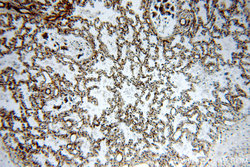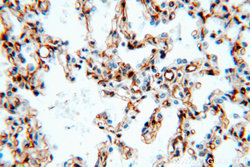Antibody data
- Antibody Data
- Antigen structure
- References [4]
- Comments [0]
- Validations
- Western blot [1]
- Immunoprecipitation [1]
- Immunohistochemistry [2]
Submit
Validation data
Reference
Comment
Report error
- Product number
- 19722-1-AP - Provider product page

- Provider
- Proteintech Group
- Proper citation
- Proteintech Cat#19722-1-AP, RRID:AB_10638469
- Product name
- SPTBN1-Specific antibody
- Antibody type
- Polyclonal
- Description
- SPTBN1-Specific antibody (Cat. #19722-1-AP) is a rabbit polyclonal antibody that shows reactivity with human, mouse and has been validated for the following applications: IHC, IP, WB,ELISA.
- Reactivity
- Human, Mouse
- Host
- Rabbit
- Conjugate
- Unconjugated
- Isotype
- IgG
- Vial size
- 20ul, 150ul
Submitted references MiR-362 suppresses cervical cancer progression via directly targeting BAP31 and activating TGFβ/Smad pathway.
USP9X regulates centrosome duplication and promotes breast carcinogenesis.
Identification of nuclear phosphoproteins as novel tobacco markers in mouse lung tissue following short-term exposure to tobacco smoke.
Global profiling of proteolytically modified proteins in human metastatic hepatocellular carcinoma cell lines reveals CAPN2 centered network.
Yang S, Sun Y, Jiang D, Wang J, Dang E, Li Z, Zhou J, Lu Y, Shi J, Tao L, Wang J, Jin B, Zheng L, Yang K
Cancer medicine 2021 Jan;10(1):305-316
Cancer medicine 2021 Jan;10(1):305-316
USP9X regulates centrosome duplication and promotes breast carcinogenesis.
Li X, Song N, Liu L, Liu X, Ding X, Song X, Yang S, Shan L, Zhou X, Su D, Wang Y, Zhang Q, Cao C, Ma S, Yu N, Yang F, Wang Y, Yao Z, Shang Y, Shi L
Nature communications 2017 Mar 31;8:14866
Nature communications 2017 Mar 31;8:14866
Identification of nuclear phosphoproteins as novel tobacco markers in mouse lung tissue following short-term exposure to tobacco smoke.
Niimori-Kita K, Ogino K, Mikami S, Kudoh S, Koizumi D, Kudoh N, Nakamura F, Misumi M, Shimomura T, Hasegawa K, Usui F, Nagahara N, Ito T
FEBS open bio 2014;4:746-54
FEBS open bio 2014;4:746-54
Global profiling of proteolytically modified proteins in human metastatic hepatocellular carcinoma cell lines reveals CAPN2 centered network.
Shen C, Yu Y, Li H, Yan G, Liu M, Shen H, Yang P
Proteomics 2012 Jun;12(12):1917-27
Proteomics 2012 Jun;12(12):1917-27
No comments: Submit comment
Supportive validation
- Submitted by
- Proteintech Group (provider)
- Main image

- Experimental details
- mouse brain tissue were subjected to SDS PAGE followed by western blot with 19722-1-AP(SPTBN1-Specific antibody) at dilution of 1:300
- Sample type
- tissue
Supportive validation
- Submitted by
- Proteintech Group (provider)
- Main image

- Experimental details
- IP Result of anti-SPTBN1-Specific (IP:19722-1-AP, 5ug; Detection:19722-1-AP 1:600) with HEK-293 cells lysate 1000ug.
- Sample type
- cell line
Supportive validation
- Submitted by
- Proteintech Group (provider)
- Main image

- Experimental details
- Immunohistochemical of paraffin-embedded human lung using 19722-1-AP(SPTBN1-Specific antibody) at dilution of 1:100 (under 10x lens)
- Sample type
- tissue
- Submitted by
- Proteintech Group (provider)
- Main image

- Experimental details
- The SPTBN1-Specific antibody from Proteintech is a rabbit polyclonal antibody to a peptide of human SPTBN1-Specific. This antibody recognizes human, mouse antigen. The SPTBN1-Specific antibody has been validated for the following applications: ELISA, WB, IHC, IP analysis.
 Explore
Explore Validate
Validate Learn
Learn Western blot
Western blot ELISA
ELISA